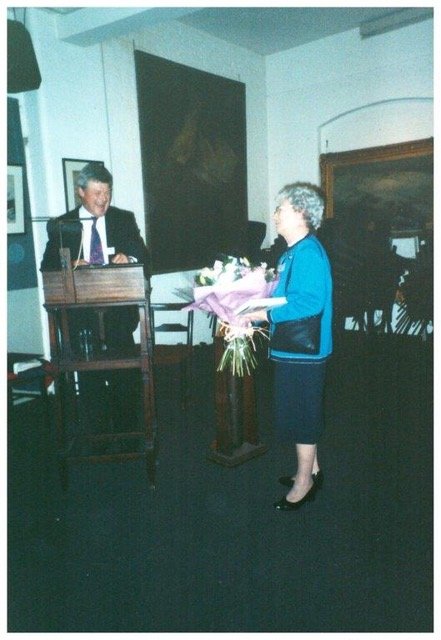I don’t believe that the rigorous literary critic Al Alvarez actually held mountaineering literature in much of a high regard. When I asked him to talk about his favourite climbing book at the 14th International Festival of Mountaineering Literature in 2000 he chose to talk about Apsley Cherry-Garrard’s polar epic The Worst Journey in the World. After the judging of the third and fourth BT awards was over Al Alvarez sold his 20 or so books to pay for his poker stakes in his weekly games with Ian McNaught-Davies. Al went on to write a book about poker, Risky Business, as he had about that other risky business of hanging out with the climbers around Julian Vincent Anthoine in Feeding The Rat. The best line I ever heard from Mo Antoine was at a BT award ceremony at the Alpine Club. The Alpine Club poet and eccentric, Ronnie Wathern, used to sit in a corner on such occasions and play the Uilleanpipes, working the bellows vigorously with his elbow. Mo said to him, ‘Is it dead yet? I should get it by the throat.’
In 1992 I judged the BT with Ronnie and we became friends, climbing together in Majorca where Ronnie had built an unusual house in 1968 in Deià to be close to his poetic mentor Robert Graves. In the street one day Ronnie introduced us to Graves’ long-suffering widow Beryl who was out shopping. Ronnie’s eclectic list of friends also included Paddy Maloney of The Chieftans, Don Whillans and the philosopher R. D. Laing. On a climb of the soaring ridge route ‘Sa Gubia’ in Majorca,Ronnie, who climbed in a Harris tweed jacket, would produce offers of sustenance from different pockets. There were three of us, led by my regular partner Norman Elliot, so we spent quite some time on the stances where Ronnie would quote poetry in between saying, ‘Would you care for an orange? A clove of garlic, anyone?’
Ronnie and I judged the BT with Livia Gollancz, the professional musician whose playing of the French horn eventually gave her such dental problems that she had to give it up and work at her father’s publishing house. At Victor Gollancz Ltd Livia, who had been a member of the Ladies Alpine Club since 1966, developed a modest but notable list of mountaineering books, including Joe Brown’s The Hard Years, one of the first she acquired as managing director of the company after her father retired. Livia was clearly a formidable woman, but with a gentle voice and an open mind. When we met in her house in Highgate I remember the impressive collection of alpines in her garden.
Like Janet Adam-Smith (‘I’ve never had any problems being a woman!’), Chair of the BT in 1988, Livia did not see any need for positive discrimination for women writers, even though, in their time, mountaineering literature consisted almost entirely of male voices and masculine narratives. One of the most striking changes of the last forty years is the increase in the number of entries to the BT by women authors and the corresponding number of female winners. Whilst the entries simply reflect publishing trends, it could be argued that the BT’s choice of female judges may have offered some kind of encouragement to women writers. Indeed, the first three of such judges were Janet Adam-Smith, Lucy Rees and Livia Gollancz, appointed from the third award onwards. The very first BT winner in 1984 was a woman, Linda Gill,for Living High: A Family Trek in the Himalayas. Then it was not until the ninth award in 1991 that the prize again went to a woman, the novelist, Alison Fell, for her Mer de Glace. Since then, women have won with biographies and memoirs, perhaps the most radical, risky and riveting of the latter is the most recent joint winner, Helen Mort’s A Line Above the Sky: On Mountains and Motherhood (2022).
This book is a marker of just how far the possibilities of what can be explored in women’s climbing writing have come since the first award to Living High: A Family Trek in the Himalayas. In a 2006 essay on the inhibitions holding back British mountaineering literature I wrote that ‘only in the last decade has British climbing writing begun to emerge from what might be called “the Rock and Ice era” [that] created an image of men who said little, wrote nothing (certainly not poetry), but acted eloquently’ (Reconnecting With John Muir, p. 158). This slight exaggeration was aimed at the masculine fear of expressing emotions, represented in the minds of climbing magazine editors in particular, by poetry. Poetry remains a challenge for BT judges since in forty years only one poetry book has been awarded the prize, Charles Lind’s long narrative poem An Afterclap of Fate: Mallory on Everest (2006). In her book Helen Mort writes: ‘If there is no risk in my writing, no fear, there is no pleasure. I have to make myself feel uncomfortable, take chances in the way a mountaineer does, calculating and recalculating, pitching their frail body against the wind. In risk, we feel most alive.’ For those who have not yet read A Line Above the Sky, in this book Mort is intimate and unsparing in examining her experience of pregnancy, giving birth and the first years of motherhood as a climber and fell runner fascinated by the experience of Alison Hargreaves who sits on her shoulder throughout as her ‘ghost companion’.
Of course, the Alison Hargreaves narrative inevitably leads towards the death of her son, Tom and here the parallel ‘ghosting’ story might have becomeuncomfortable. Mort recounts watching reports of Tom’s disappearance and search efforts hourly through the night whilst breastfeeding her three-month-old son Alfie. Her emotional investment is clear. Later, while Alfie is safe at pre-school, there is a knock at the door. ‘I could not shake the instinct that something must have happened to him’, Mort writes. In fact, it is an acquaintance calling to warn her that her face has been superimposed on a body on a porn site – the ultimate crossing of the line of her own body. In writing about this Mort ‘takes back control’. Women, she says, have always been judged by the world by more than their subjective selves, as in the duality of mother/climber in Alison Hargreaves’ case. Mort’s conclusion to this book is to reflect upon the multiple roles of the women who came before her, her present friends and, as poet and novelist, her fictional characters: ‘If women are always to be doubled, surveyor and surveyed, then let us be multiple. Let us stand so close that we seem to merge together, the dead and the living, the real and the fictional.’
It is hard to avoid a comparison with Mort’s joint winning book, Brian Hall’s High Risk: Climbing to Extinction. The lives and deaths of eleven men are remembered by Hall, the survivor, like John Porter, of a generation of climbers who balanced style against risk and ultimately lost what they had won. But it has to be said that Hall, who unlike Mort, is not a poet and wordsmith, captures more of character and emotion than would have been the case, perhaps, forty years ago. His grief is heartfelt, his character judgements open and honest, and his personal responsibility unflinchingly examined. As the Chair of judges Marni Jackson said, the writing achieves a spirit of ‘humour, affection and respect’ that counterbalances the grim conclusion to each chapter.
From the second International Festival of Mountaineering Literature, we invited each year thereafter the Chair of judges at the BT to deliver the adjudication address which had been given only a few months previously to a small audience at the Alpine Club in London. The aim was to support the BT by offering a public discussion of the judgement and a reading from the winning book. Without exception the judges undertook this exposure unflinchingly, relishing the discussion and ready to respond to a pointed Ken Wilson question. Well before the days of Kendal Mountain Festival, writers also welcomed reaching a bigger audience. (They were not originally invited to read from their winning books after the announcement. A quick retreat to The Carpenter’s Arms followed by a long celebration was the norm.)Regularly in the audience at the festival were the mothers of Pete Boardman and Joe Tasker who stayed for the whole day, seemingly fascinated by the writing displayed and debated in a culture to which their sons were major contributors and to which they had substantially added by creating the BT award.
Each year the BT shortlist offers a snapshot of the advances in approaches to adventure writing that I’ve been suggesting. In 2020 I published, in a book titled Walking, Landscape and Environment, a chapter that read the five shortlisted books of 2016 as each engaging in different ways with elements of dark experience within what might seem pastoral journeys. In this chapter, ‘Mountaineering Literature as Dark Pastoral’, I argued that these five books which I’d been judging in my second stint, this time with Graham Desroy and Helen Mort, each touched upon, or had implications for, what is now more widely known as the Anthropocene. As our environmental crisis deepens it is salutary to see that ‘the best literary work […] the central theme of which is concerned with the mountain environment’, as the BT defines its constituency, engages with the greatest of cultural and political challenges that we face.
Katie Ives makes this point in her 2020 Chair’s speech, one which any aspiring mountain writer would benefit from reading on the BT website (another great resource enriching our culture). The values illustrated in this speech by quotations from very different books should offer a guide to any would-be entrants for this award. Katie quotes Dave Cook’s critique of climbing writing which we commissioned for the first festival in 1987 and which became a manifesto for all further 21 festivals (Orogenic Zones, 1994, pp. 7-13). Dave called for more varied voices, including women and people of colour, for less obvious sources of inspiration, for acknowledgement of the ‘interconnections’ between experiences in the mountains and the rest of life, and to reassert ‘some of the values of humanity and fellowship against the imperial colonisation of the hills’. It is great to hear a BT judge celebrate the fact that some of Dave Cook’s ideals have been realised in the last 40 years and that we can all benefit from this ourselves if we only read the BT shortlist or at least the BT winners. Indeed, after 40 years, something good has come out this.
Cooky would say that there has to be more to come.
Terry Gifford July 2023




























